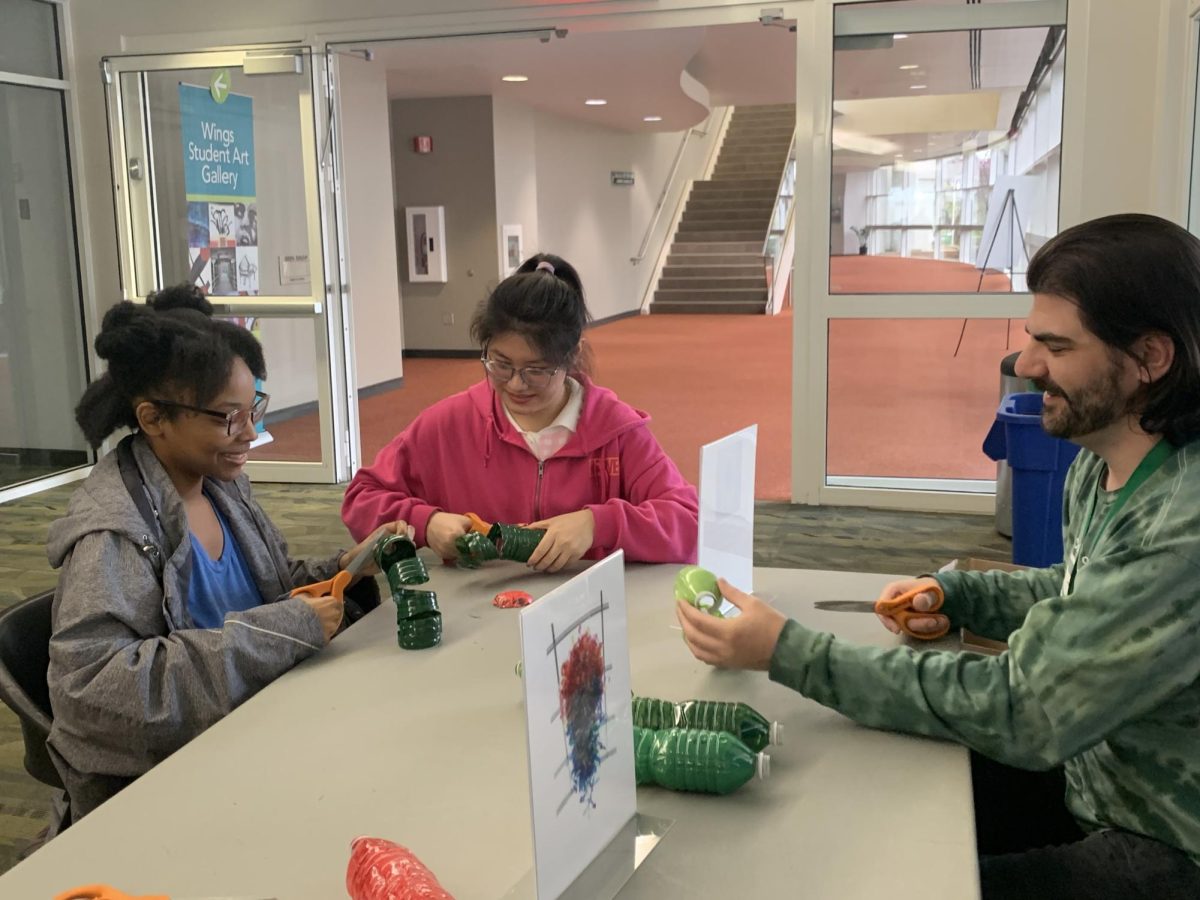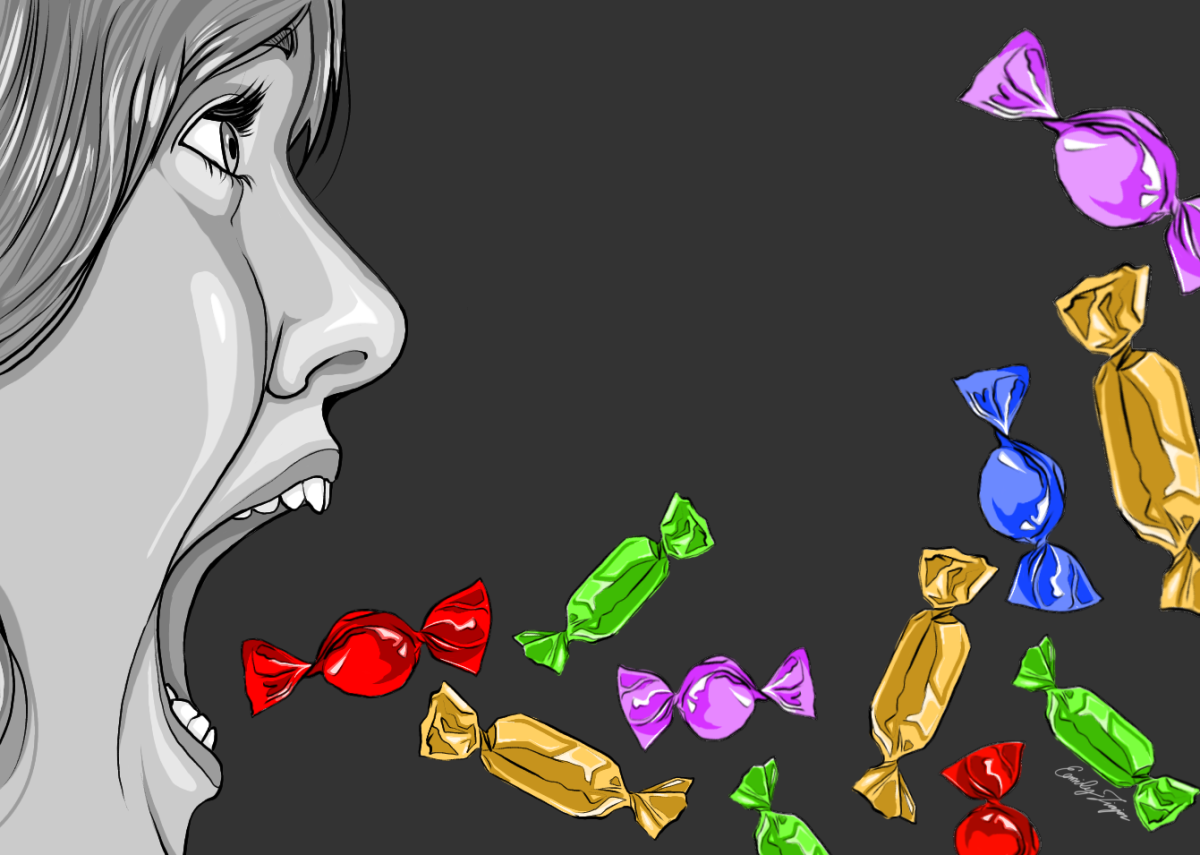In commemoration of Earth Day, COD Cares is preparing a ribbon-like fixture for display on campus by the COD greenhouse, except the ribbons are not made from fabric— they are made from plastic.
This past Thursday, COD Cares invited students passing by the Wings Art Gallery in the SSC to stop by and cut painted water bottles into ribbons, requesting that they keep the mouth of each water bottle intact for easy fixture to the cardboard frames they will be bound to. Many pairs of scissors were provided so that many people could contribute to the creation of the ribbons at a time.
Leo Boshardy, an assistant editor in Community Engagement at College of DuPage, said COD Cares aims to foster a sense of community through these events, as well as inspire students to attain ideas for how to recycle their very own waste.
“[We hope for attendees to gain] a sense of community and getting together with students that they don’t normally interact with while making new connections,” he said. “Hopefully, we could just give people more ideas on what they can do with their recycled things. So if they happen to find that they have a big mountain of plastic bottles, and they don’t know what to do with it. Well, this is an idea of what you could possibly do.”
Alexcice Harker, a Human Services major at College of DuPage, was drawn to the event by the wide array of colors among the painted water bottles. She said the water bottle project was an effective way of spreading the word about sustainability.
“The colors [attracted us],” she said. “We got bored after class [and came]. I think [the project is] a really good way to bring people together and not only to help with the project but to spread the word about the project that’s good for [environmental] advocacy.”
Jorie Alexander, an English major at College of DuPage agreed, noting the social nature of the Water Bottle Project in which people cut plastic together.
“Turning sustainability into something fun [is] really encouraging,” she said. “There are a lot of people that like working with other people.”
Joan Di Piero, a community engagement coordinator and manager of COD Cares, said the Water Bottle Project is inspired by American artist Dale Chihuly. The nature-inspired themes and motifs are commonly seen in Chihuly’s artwork, which coincides with sustainability.
“[Chihuly is] totally inspired by anything nature from sea animals, shells, water,” she said. “He does a lot of flowers, so his art, while it’s all glass, is inspired by nature.”
By 11:30 a.m. Di Piero announced that most of the painted plastic bottles had been cut— an hour and a half before the event’s scheduled closing.
Boshardy proposed some potential arrangements for how the different colored plastic ribbons will be configured to create the Chihuly-inspired fixtures.
“We think we’re probably going to try and do it randomly,” he said. “We have such a large amount of bottles at this point we might try and do a couple different types, maybe one like a specific type of color palette and just all the blues and all the light blues together. But at the moment we don’t really know.”
Boshardy explained the project’s goal is to inspire environmental awareness and encourage sustainable action while still keeping such action fun and enjoyable for people.
“We all know because of global warming we want to try and reduce our carbon footprint,” he said. “So this is a way of doing that in a way that’s fun, that doesn’t make it feel like it’s a job. If this is one way to take care of your recycled goods, maybe it could inspire you into doing something else with different [types of waste].”
According to earth.org, a carbon footprint is a measurement of the total amount of greenhouse gasses emitted by a single person, group, event or object. The bigger a single entity’s carbon footprint is, the more harm they are doing to the environment. Greenhouse gases trap the heat of the sun, contributing to global warming. The way in which plastics are produced and combusted involves oil and gas, which emit significant amounts of greenhouse gasses. By reducing plastic water bottle use, people can reduce their carbon footprint and contribute to a healthier environment.
Maryam Atcha, a Business Administration major at College of DuPage, said hosting more events such as the Water Bottle Project would aid significantly in encouraging students to be more eco-friendly.
“I think that we should implement more ways that we can recycle through more events like this where you can recycle and turn trash into something nice,” she said.
Alexander said there are labeled waste bins all around campus that encourage people to properly dispose of their trash, which she believes is an easy way to be more sustainable.
“I feel like if people actually pay attention to which trash bin they’re putting their trash into, that would be the easiest way [to be more eco-friendly],” she said. “I feel like [this is an issue] not just at COD but in public places in general. I feel like people are really busy people who don’t take the time to read [the bins]. A lot of people just throw it in and go. And I’m also guilty of that.”
Atcha, Harker and Alexander expressed interest in attending the third and final phase of the Water Bottle Project on Tuesday, April 24 from 10 a.m. to 1 p.m. in the Wings Student Art Gallery, where the public is invited to help attach the plastic ribbons to cardboard frames and form the Chihuly-inspired art fixtures.









